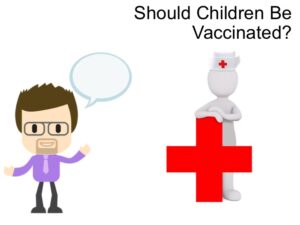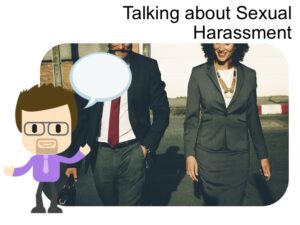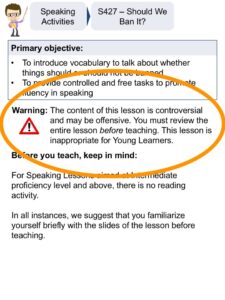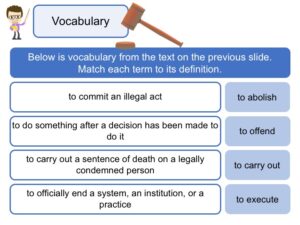8 min read
Share this post

.
Have you wanted to add a bit of spice to your speaking skills lessons? Have your students ever asked for something a little more exciting to talk about? Having a discussion about controversial ESL topics can bring a burst of new energy into a classroom, but be careful: sometimes the burst can be more of an explosion!
If you are planning to approach more adventurous ESL topics this year, read on. We’ve got a bit of guidance for you. After all, you don’t want to set off a firestorm in your learning environment!
.
.
Controversial ESL topics allow students to practice discussing issues that can elicit an emotional response. We all require an ability to speak and write about topics from a detached point of view. In addition, we should possess a capacity to view and present both sides of an argument. Finally, we should also learn to clarify our own point of view while showing respect and tolerance for others’. If you use controversial ESL topics successfully, your students will be better equipped to present a balanced point of view. This skill is always of benefit in an age of constantly seething social media, political partisanship, and increasing populism.
.
.
Not all educators possess the right skills to teach controversial ESL topics, and that’s fine. Each of us probably dislikes teaching a  certain area of grammar or maybe lacks confidence teaching a particular skill. If you want to teach controversial topics, you’ll need experience, maturity, an academic detachment to the topic, and a capacity to moderate the discussion.
certain area of grammar or maybe lacks confidence teaching a particular skill. If you want to teach controversial topics, you’ll need experience, maturity, an academic detachment to the topic, and a capacity to moderate the discussion.
Be careful attempting controversial topics if you are new to the ESL classroom; it could be a disaster waiting to happen. As the teacher, you set the tone of the discussion, so be a good example! Remain impartial no matter what your beliefs happen to be. Remember that the goal of the lesson is to encourage speaking skills around difficult topics — not to win an argument.
Most importantly, you must be able to keep a discussion tied to the subject, check negative thinking, and disallow statements that speak from authority. Students should provide examples to back up claims and assertions. If you have the experience, maturity, and skills, go for it. Otherwise, avoid controversial ESL topics until a later point in your ESL teaching career.
.
.
First, students need at least upper intermediate proficiency to tackle controversial ESL topics. These topics will naturally encourage students to express their opinions, so don’t open Pandora’s Box for students who are less than CEFR B2.
As a teacher, you may find yourself in a compromising situation by raising a topic  that students can’t discuss effectively. Emotions will run wild when words fail. Second, you must have a long-term relationship with the students and possess a general understanding of the student’s worldview. Don’t try controversial topics with students you don’t know well. Avoid them with students who you perceive as narrow-minded. You’re not here to change the world. Your job is to develop a student’s ability to express views and experiences, not to challenge the student’s personal and cultural values. Third, a student handles controversial topics better in a one-to-one class than with their peers. If you’re lucky enough to teach online, one-to-one can be a fertile environment to teach controversial ESL topics. The absence of peer pressure and lack of physical proximity can make a student feel more relaxed and assertive.
that students can’t discuss effectively. Emotions will run wild when words fail. Second, you must have a long-term relationship with the students and possess a general understanding of the student’s worldview. Don’t try controversial topics with students you don’t know well. Avoid them with students who you perceive as narrow-minded. You’re not here to change the world. Your job is to develop a student’s ability to express views and experiences, not to challenge the student’s personal and cultural values. Third, a student handles controversial topics better in a one-to-one class than with their peers. If you’re lucky enough to teach online, one-to-one can be a fertile environment to teach controversial ESL topics. The absence of peer pressure and lack of physical proximity can make a student feel more relaxed and assertive.
Finally, such topics are clearly inappropriate for Young Learners.
Ensure that your students have the age and maturity to speak about challenging topics. In short, know your audience.
.
.
A discussion about atheism is not the same as practicing the present perfect. As an educator, there are some classes that you can teach without preparation. However, controversial ESL topics always require planning, even if you are teaching that same lesson on atheism for the tenth time. Why? Because student views on atheism will be wildly more passionate and disparate than their views on the present perfect. Ask these questions below each time you intend to undertake a controversial ESL topic. If the answer to any question is no, don’t proceed.
.
1. Are you emotionally detached enough from the topic to teach it?
2. Is the lesson time adequate to present a balanced view of the topic?
3. Have you reviewed all materials in the lesson plan?
4. Are your students old enough and mature enough to handle the lesson content?
5. Are you aware of the students’ cultural background and worldview?
6. Will the students be able to engage in a discussion of the topic?
7. Do you have other material prepared if the lesson progresses badly?
.
While it might seem like overkill, teachers often have strong opinions that can infiltrate and pollute a discussion. If there’s a risk that the topic will send you on an ideological rant, don’t teach it. Likewise, it is not your job to highlight the perceived faults of your student’s government’s policies. It sounds obvious, yet some ESL teachers think their job is to decry the death penalty, promote human rights, or point out the flaws of evolution theory. It is not.
.
.
Make sure that you allow students enough time to discuss and debate adequately. Students must have the opportunity to present, clarify, reject, refute, and amend a point of view. If there’s no time for a healthy discussion, don’t teach the topic. Nothing would be more frustrating to a student than a one-sided presentation on the death penalty without time for an open discussion. Controversial topics are not a warm-up exercise!
During a ‘normal’ lesson, a student may pose a question or make a comment on a controversial topic. For example, a student may express a political view on healthcare when discussing illness. Rather than say, ‘Hey, I’ve got a lesson that you’d love!’, perhaps suggest that you discuss conservative and liberal political views in an upcoming lesson. This allows you time to prepare and to gauge the student’s enthusiasm for the topic. Remember that any controversial ESL topic is foremost about improving speaking skills!
Controversial topics in the ESL classroom can be enormously rewarding for teachers and students. Such topics make a great change from reporting what students did last weekend. Students with a high level of proficiency relish the opportunity to express personal points of view and to speak about something out of the ordinary. And controversial topics should remain that way – a little out of the ordinary. They are a great way to insert life and emotion into your lessons while developing students’ speaking skills. Just make sure that you know what you’re doing. You have been warned!
.
.

.
Disclaimer:
The material in these lessons is deliberately controversial. Off2Class points out that all views expressed in the material are to provoke discussion and debate in the learning environment. They do not reflect the personal views or opinions of Off2Class and its staff. Educators, teachers, and instructors are reminded to review each lesson on a controversial topic in its entirety before teaching.
.
.
This lesson is a good introduction to talking about controversial issues. Wearing fur, smoking tobacco and blood sports are good examples of activities that have been controversial for a while now. You and your students may already have an opinion to get the conversation started. There are ample questions to gauge your students’ willingness and ability to talk about controversial topics in a mature and disengaged manner.
.
.
Is there are a difference between flirtatious behavior and sexual harassment? Are some cultures simply more tactile than others? If people dress in a certain way, they’ll naturally attract attention. Won’t they?
.
.
More and more countries are saying goodbye to a penalty that seems both inhumane and medieval. Except, both the US and Japan still have the death penalty. Two-thirds of the world’s population lives in countries where capital punishment still exists.
.


.
.
Talking politics can be tricky business. In this lesson, the student has an opportunity to provide a point of view on a number of statements. Depending on the answers, you should be in for some provocative discussions!
.
.
At the turn of this century, Andrew Wakefield published a paper that linked autism to vaccines, causing some parents to question the value of vaccinating their children. Despite the fact that not a single case of autism linked to vaccines has been established, vaccination rates have dropped. Governments have stepped in; but do they have the right to do so?
.


.
.
Share this post



24 Comments
What a terrific article – thank you! I will share this with our intermediate and advanced ESL teachers. I am not liberal or conservative but somewhere in between. Politics isn’t an easy conversation topic and many people have strong opinions. It is important to be open minded and respectful in the ESL classroom. Thank you.
Thanks Tracy!
I absolutely agree – politics is one of the trickiest topics to deal with in any classroom!
I hope that your colleagues will be able to make use of them.
Best wishes,
James
I agree Tracy – it is a great article and amazing suggestiions for teachers of English Language Learners in particular but all students in general. As a classroom teacher, what has helped me is using picture books to teach aboout either controversial or difficult issues such as Residential Schools. It is important that as educators we take time to discuss someof the current issues and have students give their opinions in a non-threatening environment (which you would have set protocols and expectations for). A lot of these topics are news headlines and through media literacy we can support students’ understanding of bias and specifically whose voices are not being heard.
Thanks for the great suggestion. I will certainly use this with my students!
Thanks for stopping by Vivienne.
Please send me feedback if you do use these with your students. I’d love to know if the lessons were beneficial in promoting healthy discussion in the ESL classroom!
James
For sure I will! The least I could do! Thanks!
I’m neither classic liberal nor conservative. I already do cover controversial topics with my students, but only for intermediate (ideally upper-intermediate/advanced) students. I have used Off2Class material with them. Have you heard of term ‘PARSNIPS’?
http://bravelearning.com/2015/11/02/controversial-topics-in-teaching-parsnips-in-elt-an-eltchat-summary/
Hi Phil,
Great to hear from you. It’s many years since I heard about PARSNIP and in all honesty, I’d completely forgotten about it. Most of my teaching experience outside my own country was to Middle School students in a culturally conservative country; I think PARSNIP was so deeply entrenched in my lesson planning that I didn’t think about it consciously anymore.
Let me know if you know of any controversial topics that we should feature in our lesson library.
Best wishes,
James
One of the materials I use often in my English Learner Conversation Class is breakingnewsenglish.com. This website targets five current news articles a week. Many of them are controversial. We begin by reading one of the abridged articles and move on to conversation. Ground rules call for politeness in listening to all opinions and no editorial comments from the teacher.
Rosemary,
How do students cope with the large amount of vocabulary in these texts? Do you cover text in one lesson and speaking in a following lesson?
Regards,
James
The text in breakingnewsenglish.com is a synopsis of current events for different levels of ESL students. Often the same topic will be offered at different ESL levels, based on length and vocabulary
Awesome post! I will implement some of the suggestions. Thank you!
Thanks Giselle for your positive feedback!
Regards,
James
I love the suggestions. They will really help me with my students. Thank you very much.
Hi Gilda,
Thanks for stopping by!
James
Hmm, maybe, that’s what I need to sipce things up a little in my classes.
I’ve never dealt with a controversial topic. sometimes they just pop up during conversation and when I see that things are escalating, I change the topic.
I’ll check these lessons up.
They start in S428, right?
S427 with the lesson: “Should we ban it?”
These lessons can definitely add spice!
Thanks for this article! Exellent topic!
Glad you like it!
I had not seen these lessons until now. The clarity of the advice given together with the presentation make them very appealing though.
I like the way you encourage being dispassionate and careful, with the call to direct the student to comment on a controversial topic area.
I’d hope these qualities were measured appropriately in lessons I have conducted to date in these areas. Certainly I am very aware of my current student’s background, and the factors that impinge on her viewpoint. Some invigorating, constructive discussions have ensued. Perhaps due to the student’s Asian temperament these have never lost control!
The lessons here encourage me to deliver a more organised and careful approach to controversial topic areas, especially if I taught students with a different kind of temperament.
As usual, I am grateful for the professional and clear presentational guidelines that Off2 Class enables in my lessons. Thank you once again.
Hi Nicholas, glad you’re getting a lot out of the controversial lessons!
An interesting and very controversial topic I have often discussed with my advanced adult students is terrorism. I come from Ireland and teach in Germany, where opinions are predictably conservative. The discussions have always been rewarding and informative.
That’s an interesting one. Are there any specific articles or resources you use to discuss it?
First of all it is interesting to discuss questions like “What is a terrorist?” “What is terrorism?”
Later discuss questions like:. “Can terrorism be justified?”
Later:
Wikipedia is excellent for information on historical figures who were once most wanted terrorists and who later became statesmen. e.g. The first leaders of Ireland, Israel, Kenya etc.